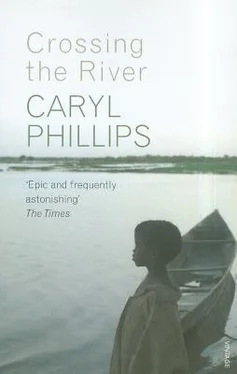Caryl Phillips - Crossing the River
Здесь есть возможность читать онлайн «Caryl Phillips - Crossing the River» весь текст электронной книги совершенно бесплатно (целиком полную версию без сокращений). В некоторых случаях можно слушать аудио, скачать через торрент в формате fb2 и присутствует краткое содержание. Год выпуска: 2006, Издательство: Vintage, Жанр: Современная проза, на английском языке. Описание произведения, (предисловие) а так же отзывы посетителей доступны на портале библиотеки ЛибКат.
- Название:Crossing the River
- Автор:
- Издательство:Vintage
- Жанр:
- Год:2006
- ISBN:нет данных
- Рейтинг книги:4 / 5. Голосов: 1
-
Избранное:Добавить в избранное
- Отзывы:
-
Ваша оценка:
- 80
- 1
- 2
- 3
- 4
- 5
Crossing the River: краткое содержание, описание и аннотация
Предлагаем к чтению аннотацию, описание, краткое содержание или предисловие (зависит от того, что написал сам автор книги «Crossing the River»). Если вы не нашли необходимую информацию о книге — напишите в комментариях, мы постараемся отыскать её.
Crossing the River — читать онлайн бесплатно полную книгу (весь текст) целиком
Ниже представлен текст книги, разбитый по страницам. Система сохранения места последней прочитанной страницы, позволяет с удобством читать онлайн бесплатно книгу «Crossing the River», без необходимости каждый раз заново искать на чём Вы остановились. Поставьте закладку, и сможете в любой момент перейти на страницу, на которой закончили чтение.
Интервал:
Закладка:
APRIL 1943
He came on the Sunday morning that I go down to visit my mother. The first Sunday morning of each month. He was dressed smartly in his uniform and he was carrying yet more daffodils. I’ve brought you some more of these yellow flowers. I like how they look. I smiled. Once again, I left him in the front of the shop while I went around the back to find a jar. I saw the ring that I’d taken off and put by the kitchen tap. My God, what was I doing? There was something brassy about having taken it off and not having replaced it. But I didn’t care. I left the ring there, jammed the flowers into a jar, and came back through into the shop. I didn’t know if I should bring you some candy, he said. But it doesn’t matter. I can let you have some whenever you want. All you have to do is say when. He seemed nervous, so I touched him on the arm. That’s all right, I said. Don’t worry. Let’s go. I smiled at him and he seemed to relax a little. For a walk? Not exactly, I said. I thought we could go and see my mother. His face dropped. It’s all right, I said. She’s dead. He didn’t know what to do. I tell you what. I’ll take the flowers, if that’s all right with you. We can put them on the grave. Then he started to laugh, and I realized that it would be all right. My mother used to like flowers, I said. I took them out of the jar. We waited at the bus stop. People passed by on their way to church. It was nothing to do with him. They didn’t talk to me anyhow. I wondered if there was some way of letting him know this. That it wasn’t anything to do with him why they weren’t talking. But I decided that it was too early to tell him this. I might as well let him work some things out for himself. We talked on the bus. Most of the time I just listened, for he talked more than I did. He told me a bit about himself, and why he joined the army. Me, I didn’t like to ask too much because I don’t know much about Americans. Or Coloureds. I was sure that I was going to make a mistake. Bound to. So I said nothing. I just kept my mouth shut and listened to him talking to me in that sing-song accent of his. I like it. It makes me laugh, although I’m not sure that it’s supposed to. The way he stretches out words. When we got to town we went straight to the cemetery and he was very proper. I let him put the flowers on my mother. He asked me if I wanted to say a prayer. I looked at him, unsure as to what to do. I thought I’d better just tell the truth. I don’t know any prayers, I said. This wasn’t really true. I do know some, but I’m not very good at such things. Like prayers. He said that was all right, but would I mind if he said one. I said, course not. So he did. When it was over, I thought that I’d better tell him that there’s not really that much to see and do in the town. That’s the honest truth. I don’t care what anybody says. It’s not really any place to show a visitor. He suggested that we could talk as we walked the streets, so we did. And again we talked about him, and I tried to avoid the way people were looking. They were looking at me. Not him. They just nodded at him. Some people asked him for a Lucky Strike. He always gave away two, and a smile. I thought that was nice. It made me think nice things about him. But nobody would say anything to me. I knew what they were thinking. That he was just using me for fun. There was no ring on my finger, but I didn’t think that they had the right to look at me in that way. Just who the hell did they think they were? I told my friend that I thought we should sit down in the park for a minute. I didn’t feel all that well. In fact, I told him, I felt a bit dizzy. He wrapped his finger and thumb around my wrist. You sure you’re getting enough to eat? Yes, thank you. You sure you don’t want me to fix you up with some Hershey bars? I smiled. We sat awkwardly and in silence, he with his thoughts, I with mine. I just kept thinking, I can’t see what they’re getting out of it. Being so cruel. But I was just making myself more and more angry, and I could sense that it was getting difficult for him. I slipped my arm inside his and asked him if he fancied going to the pictures. He smiled. Sure, why not? And so there we were, in the dark in the Elektra Palace, watching the first house, but I wasn’t really watching, and I sensed that he could tell. I felt such a fool, but I didn’t know how to tell him that it wasn’t his fault. That it was nothing to do with him. Honestly. When we came out it was dark and I knew we’d missed the bus. I didn’t know what to do. We walked aimlessly towards the bus stop and then I realized that I’d better own up. He looked at his watch. I’ve got to be back in an hour. Surely there’s some other way? What about a taxi? I told him that I’d never taken a taxi. I didn’t know if they still ran, what with the blackout and everything. Then I told him that I was sorry. That I didn’t want to get him into trouble. He looked at me. Don’t worry. It’s not your fault. I knew he wasn’t telling me the truth. He was trying to spare my feelings. We stood and waited for an imaginary taxi. Small ‘starlight’ bulbs have now replaced all the standard ones. These bulbs cast faintly illuminated circles down on to the pavement, which is supposed to make it easier for us to see. I explained to him that apparently you can’t see these lights from above. He touched my arm. I could see that he was worried. After half an hour, he flagged down a military jeep. MPs, he whispered. We both climbed into the back of the jeep. He told them I’d been kind enough to introduce him to my mother. Then she got sick and we had to wait on her. I wanted to laugh, but I was frightened. The two men in the front of the jeep said nothing. And I knew now that I had got him into big trouble. I wanted the earth to swallow me up. He laced his hands around his knees and we rode back in silence.
APRIL 1943
Last night I dreamed about the matinée we saw last Sunday afternoon. Not the actual film, because I hardly watched that. But a different film. In fact, it was like a different day altogether. The film was about a soldier on leave who meets a squire’s daughter. Her toffee-nosed father is a veteran of the 1914–18 war. He’s not sure about this young whipper-snapper walking out with his daughter, but slowly he comes to realize that he’s not a bad lad. And the young soldier is won over when he realizes that the old boy goes firewatching with the local yokels. In other words, he does his bit. I hated the film because it didn’t tell the truth, but my friend quite liked it. He told me that this was his first English film. Afterwards, I took him for fish and chips, then we got the bus home. When I woke up, I thought I was going to cry.
MAY 1943
I hadn’t seen him in nearly three weeks now, so I decided that the next time one of the soldiers came into the shop, I’d gather up my courage and ask him about my friend. And then this morning the officer with the dark glasses, Mr Hello, Duchess, he popped in to ask the way to some place or other. After I’d told him what he wanted to know, I asked him if my friend was being punished. At first he looked surprised, then he just said, yes. I told him that this was unfair, and that what had happened was no fault of my friend’s. But the officer pretended that he didn’t hear me. He smiled, saluted, and then turned on his heels and left. I closed the shop early and began the short walk down to the camp. I went up to the soldiers on the gate. They asked me what I wanted, but I just told them that I wanted to see the man in charge and they did nothing after that. They just stood to one side and I walked right through. I went up to the main office and was shown into a room where a man was sitting behind a desk. Yes, he snapped. Then, after he looked up and saw who it was standing in front of him, he stood up and extended a hand. I’m sorry. Please take a seat. I looked at him but continued to stand. He sat down. My friend, I said. He’s being punished for something that’s not his fault. He furrowed his brow as if he didn’t quite know whom it was I was referring to. Your friend? I wasn’t about to play this game. I stared right back at him. He knew who my friend was. I went on and explained how it was my fault that we missed the bus. How I was the one, if anybody, who should be blamed. He then started to tell me about discipline. And how important it was in the army that orders were obeyed. And that if you made an exception for one, you soon found that you had to make an exception for everybody. I listened. And then I explained again that it was my fault that we missed the bus. He looked at me. What would you like me to do about it? Believe me, I said. The bloody little squirt looked back down at his desk. I’ll see what I can do, he said. Which really meant nothing, for we both knew he could do whatever he wanted to do. I turned and started to leave. But it’s not that we don’t want our men to mix with you village girls, it’s not that at all. It’s just that we don’t want any incidents. It hasn’t been easy for any of us. I turned and walked out of the door. Walking back across the camp, I had the feeling that everybody knew who I was, and that they knew why I’d been to see the commanding officer. I wandered back up towards the shop. Some villagers stopped and stared at me. They pointed by simply nodding their heads in my direction. Both inside the camp, and outside, I was attracting attention. But for the wrong reasons.
Читать дальшеИнтервал:
Закладка:
Похожие книги на «Crossing the River»
Представляем Вашему вниманию похожие книги на «Crossing the River» списком для выбора. Мы отобрали схожую по названию и смыслу литературу в надежде предоставить читателям больше вариантов отыскать новые, интересные, ещё непрочитанные произведения.
Обсуждение, отзывы о книге «Crossing the River» и просто собственные мнения читателей. Оставьте ваши комментарии, напишите, что Вы думаете о произведении, его смысле или главных героях. Укажите что конкретно понравилось, а что нет, и почему Вы так считаете.












